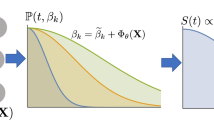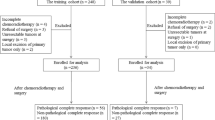Abstract
Purpose
The delivery of precision medicine is a primary objective for both clinical and translational investigators. Patients with newly diagnosed prostate cancer (PCa) face the challenge of deciding among multiple initial treatment modalities. The purpose of this study is to utilize artificial neural network (ANN) modeling to predict survival outcomes according to initial treatment modality and to develop an online decision-making support system.
Methods
Data were collected retrospectively from 7267 patients diagnosed with PCa between January 1988 and December 2017. The analyses included 19 pretreatment clinicopathological covariates. Multilayer perceptron (MLP), MLP for N-year survival prediction (MLP-N), and long short-term memory (LSTM) ANN models were used to analyze progression to castration-resistant PCa (CRPC)-free survival, cancer-specific survival (CSS), and overall survival (OS), according to initial treatment modality. The performances of the ANN and the Cox-proportional hazards regression models were compared using Harrell’s C-index.
Results
The ANN models provided higher predictive power for 5- and 10-year progression to CRPC-free survival, CSS, and OS compared to the Cox-proportional hazards regression model. The LSTM model achieved the highest predictive power, followed by the MLP-N, and MLP models. We developed an online decision-making support system based on the LSTM model to provide individualized survival outcomes at 5 and 10 years, according to the initial treatment strategy.
Conclusion
The LSTM ANN model may provide individualized survival outcomes of PCa according to initial treatment strategy. Our online decision-making support system can be utilized by patients and health-care providers to determine the optimal initial treatment modality and to guide survival predictions.


Similar content being viewed by others
Abbreviations
- ANN:
-
Artificial neural network
- AUC:
-
Area under the curve
- CRPC:
-
Castration-resistant prostate cancer
- CSS:
-
Cancer-specific survival
- CV:
-
Cross-validation
- LSTM:
-
Long short-term memory
- MLP:
-
Multilayer perceptron
- MLP-N:
-
MLP for N-year survival prediction
- OS:
-
Overall survival
- PCa:
-
Prostate cancer
References
Koo KC, Cho JS, Bang WJ et al (2018) Cancer-specific mortality among Korean men with localized or locally advanced prostate cancer treated with radical prostatectomy versus radiotherapy: a multi-center study using propensity scoring and competing risk regression analyses. Cancer Res Treat 50:129–137
Mohler JL, Armstrong AJ, Bahnson RR et al (2016) Prostate cancer, version 1.2016. J Natl Compr Canc Netw 14:19–30
Mottet N, Bellmunt J, Bolla M et al (2017) EAU-ESTRO-SIOG guidelines on prostate cancer. Part 1: screening, diagnosis, and local treatment with curative intent. Eur Urol 71:618–629
Sanda MG, Cadeddu JA, Kirkby E et al (2018) Clinically localized prostate cancer: AUA/ASTRO/SUO guideline. Part I: risk stratification, shared decision making, and care options. J Urol 199:683–690
Cuypers M, Lamers RED, Cornel EB et al (2018) The impact of prostate cancer diagnosis and treatment decision-making on health-related quality of life before treatment onset. Support Care Cancer 26:1297–1304
D'Amico AV, Cote K, Loffredo M et al (2002) Determinants of prostate cancer-specific survival after radiation therapy for patients with clinically localized prostate cancer. J Clin Oncol 20:4567–4573
Cooperberg MR, Broering JM, Carroll PR (2009) Risk assessment for prostate cancer metastasis and mortality at the time of diagnosis. J Natl Cancer Inst 101:878–887
Kourou K, Exarchos TP, Exarchos KP et al (2015) Machine learning applications in cancer prognosis and prediction. Comput Struct Biotechnol J 13:8–17
Spelt L, Nilsson J, Andersson R et al (2013) Artificial neural networks–a method for prediction of survival following liver resection for colorectal cancer metastases. Eur J Surg Oncol 39:648–654
Peng JH, Fang YJ, Li CX et al (2016) A scoring system based on artificial neural network for predicting 10-year survival in stage II a colon cancer patients after radical surgery. Oncotarget 7:22939–22947
Litwin MS, Tan HJ (2017) The diagnosis and treatment of prostate cancer: a review. JAMA 317:2532–2542
Campbell JM, Raymond E, O'Callaghan ME et al (2017) Optimum tools for predicting clinical outcomes in prostate cancer patients undergoing radical prostatectomy: systematic review of prognostic accuracy and validity. Clin Genitourin Cancer 15:e827–e834
Chang SW, Abdul-Kareem S, Merican AF et al (2013) Oral cancer prognosis based on clinicopathologic and genomic markers using a hybrid of feature selection and machine learning methods. BMC Bioinform 14:170
Chi CL, Street WN, Wolberg WH (2007) Application of artificial neural network-based survival analysis on two breast cancer datasets. AMIA Annu Symp Proc 130–134.
Rumelhart D, Hinton G, Williams R et al (1986) Learning internal representations by error propagation. In: Rumelhart DE, MCclelland JL (eds) Parallel distributed processing 1986. MIT Press, Cambridge, pp 318–362
Hochreiter S, Schmidhuber J (1997) Long short-term memory. Neural Comput 9:1735–1780
Oh SE, Seo SW, Choi MG et al (2018) Prediction of overall survival and novel classification of patients with gastric cancer using the survival recurrent network. Ann Surg Oncol 25:1153–1159
Obrzut B, Kusy M, Semczuk A et al (2017) Prediction of 5-year overall survival in cervical cancer patients treated with radical hysterectomy using computational intelligence methods. BMC Cancer 17:840
Qiao G, Li J, Huang A et al (2014) Artificial neural networking model for the prediction of post-hepatectomy survival of patients with early hepatocellular carcinoma. J Gastroenterol Hepatol 29:2014–2020
Snow PB, Rodvold DM, Brandt JM (1999) Artificial neural networks in clinical urology. Urology 54:787–790
Stephenson AJ, Kattan MW, Eastham JA et al (2009) Prostate cancer-specific mortality after radical prostatectomy for patients treated in the prostate-specific antigen era. J Clin Oncol 27:4300–4305
Korets R, Motamedinia P, Yeshchina O et al (2011) Accuracy of the Kattan nomogram across prostate cancer risk-groups. BJU Int 108:56–60
Listgarten J, Damaraju S, Poulin B et al (2004) Predictive models for breast cancer susceptibility from multiple single nucleotide polymorphisms. Clin Cancer Res 10:2725–2737
van Stam MA, Pieterse AH, van der Poel HG et al (2018) Shared decision making in prostate cancer care-encouraging every patient to be actively involved in decision making or ensuring the patient preferred level of involvement? J Urol 200:582–589
Stacey D, Legare F, Lewis KB (2017) Patient decision aids to engage adults in treatment or screening decisions. JAMA 318:657–658
Feldman-Stewart D, Tong C, Brundage M et al (2018) Making their decisions for prostate cancer treatment: patients' experiences and preferences related to process. Can Urol Assoc J 12:337–343
Harter M, Moumjid N, Cornuz J et al (2017) Shared decision making in 2017: International accomplishments in policy, research and implementation. Z Evid Fortbild Qual Gesundhwes 123–124:1–5
Acknowledgments
This study was supported through a Young Researcher Program Grant from the National Research Foundation of Korea (NRF-2017R1C1B5017516).
Author information
Authors and Affiliations
Contributions
Protocol/project development: Koo, KS Lee, Han, Rha, Hong, Yang and Chung. Data collection and management: Koo, KS Lee, YH Lee, and GR Min. Data analysis: Kim and C Min. Manuscript writing/editing: Koo and Chung.
Corresponding author
Ethics declarations
Conflict of interest
All of the authors declare that they have no conflicts of interest to declare.
Ethical approval
All procedures performed in studies involving human participants were in accordance with the ethical standards of the institutional and/or national research committee and with the 1964 Helsinki Declaration and its later amendments or comparable ethical standards.
Informed consent
Informed consent was not required for the purposes of this study as it was based upon retrospective anonymous patient data and did not involve patient intervention or the use of human tissue samples.
Additional information
Publisher's Note
Springer Nature remains neutral with regard to jurisdictional claims in published maps and institutional affiliations.
Rights and permissions
About this article
Cite this article
Koo, K.C., Lee, K.S., Kim, S. et al. Long short-term memory artificial neural network model for prediction of prostate cancer survival outcomes according to initial treatment strategy: development of an online decision-making support system. World J Urol 38, 2469–2476 (2020). https://doi.org/10.1007/s00345-020-03080-8
Received:
Accepted:
Published:
Issue Date:
DOI: https://doi.org/10.1007/s00345-020-03080-8




